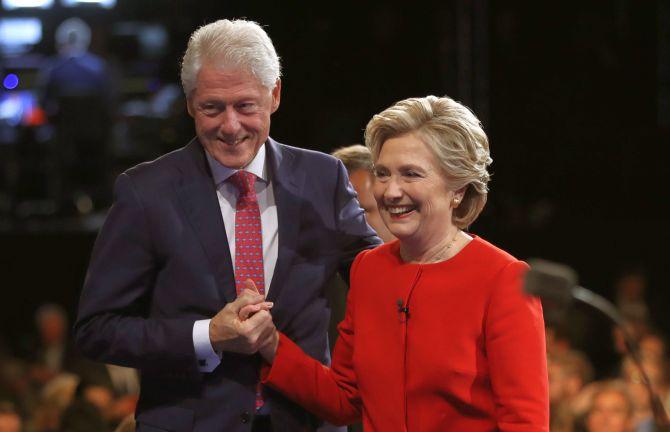The Federal Bureau of Investigation has once again courted controversy as it released heavily redacted files from its 2001 investigation of President Bill Clinton's pardon of fugitive financier Marc Rich, just one week from election day.

The bureau on Tuesday posted 129 pages from its 2001 investigation of Rich, a former hedge-fund trader who had been indicted on multiple counts of tax evasion.
The release -- issued by an automated FBI Twitter account -- quickly drew complaints from Democrats who have assailed FBI Director James Comey for his decision last week to tell Congress the bureau was reviewing emails potentially related to Hillary Clinton's private server.
The bureau has been accused by some of meddling in the final days of a hard-fought United States presidential election on November 8.
Hillary Clinton's supporters were already fuming after Comey revived the specter of her email scandal in the tense final days of the presidential election, a move that played right into Donald Trump's hands, CNN reported.
But their frustrations -- and suspicions -- intensified on Tuesday when the FBI suddenly released redacted files about its 2001 probe into President Clinton's pardon of Rich, it said.
"In an election hinging on voter perceptions of character and trustworthiness, the move revived memories of yet another political fracas surrounding the Clinton family," the network commented.
The FBI's tweet led some to conclude the documents were related to the Clintons' charitable foundation, but the tweet was referring to Bill Clinton's presidential library, which is governed by the William J. Clinton Foundation.
Bill Clinton pardoned Rich on his last day in office, one of his most controversial decisions as president. The FBI closed its investigation of Clinton's pardon for Rich in 2005 and no charges were filed against the former president.
"Absent a (Freedom of Information Act) litigation deadline, this is odd. Will FBI be posting docs on Trump's housing discrimination in '70s?" tweeted Brian Fallon, a spokesman for Clinton's campaign.
The FBI defended its actions in a statement on Tuesday.
"The FBI's Records Management Division receives thousands of FOIA requests annually which are processed on a first in, first out basis," the bureau said.
"By law, FOIA materials that have been requested three or more times are posted electronically to the FBI's public reading room shortly after they are processed. Per the standard procedure for FOIA, these materials became available for release and were posted automatically and electronically to the FBI's public reading room in accordance with the law and established procedures."
The release was posted on Twitter by @FBIRecordsVault, an account that posts material from FOIA requests on subjects of public interest.
Prior to Sunday, the account had not tweeted since October 2015. A law enforcement official told CNN that the Twitter account is an automatic feed and the tweets are not done manually.
The official said the feed was down for a year until Sunday, when it was fixed and then began tweeting automatically.
The account has recently released documents related to Donald Trump's father, Fred Trump, and the report on Hillary Clinton's email use at the State Department.
Comey, who was once a registered Republican, has been criticised by both Democrats and Republicans during the presidential campaign.
Republicans had ripped him when he recommended the Justice Department not pursue criminal charges over Clinton's use of a private server, a decision he announced in the days after Attorney General Loretta Lynch met with President Clinton on a tarmac in Phoenix.
He has also come under fire in the last week for his donations to the 2008 and 2012 Republican nominees, John McCain and Mitt Romney.
Previously, Comey had enjoyed broad bipartisan support throughout his career. In 2001, he was nominated to be the federal prosecutor for Manhattan by President George W. Bush and was backed by Senator Chuck Schumer, who is currently in line to become the Senate's top Democrat after the election.
Comey's pursuit of Rich while he was a fugitive living in Switzerland was cited in media reports from 2001 as part of his record which ultimately led to the high-profile job as New York City's top federal prosecutor.
The case was closed in 2005 without federal charges. Rich died in 2013.
Photograph: Joe Raedle/Reuters











